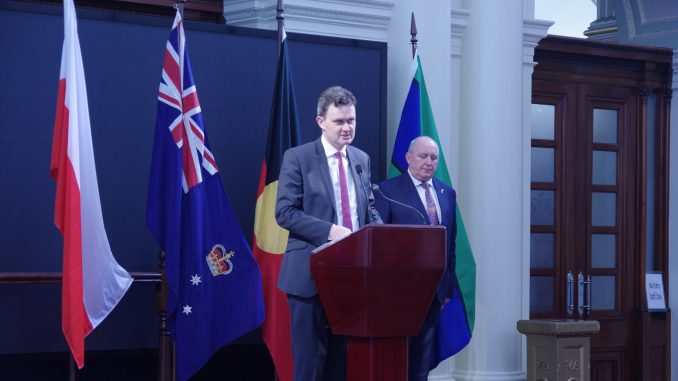
Poniżej zamieszczamy przemówienie Ministra ds. Kombatantów Hon Robin David Scott MP, które zostało wygłoszone podczas otwarcia wystawy „Walka i cierpienie” 29 sierpnia br.
Good afternoon. I would like to acknowledge the Traditional Owners of this land and pay my respects to their Elders, past, present.
Acknowledgements :
Mr Marian Pawlik OAM, President of the Polish Community Council of Victoria
Mr Michał Kotadziejski His Excellency, Ambassador of the Republic of Poland
Dr George Łuk-Kozika Honorary Consul-General of Poland Members of the Consular Corp
Fellow Members of Parliament
Members of the Polish Community
Ladies and Gentleman
Speech
Thank you for inviting me to be a part of the launch of this impressive exhibition and giving me the honour of speaking to you all.
The role of Poland during the Second World War has often been overshadowed by other events in history books, in western films, and in popular history.
The role that Polish people played in resisting the occupation of their country, and the incredible efforts made by Polish people to defeat their oppressors and refuse to accept the fate assigned to them are frequently historical footnotes, rarely told in full colour, nor given the attention they deserve.
As Minister for Veterans, I want to pay respect and acknowledgement to those Poles who continued to fight in the Polish forces, under command from the Polish Government in Exile.
Joining up with the allies, including fighting alongside Australians, this immense force participated in every branch of the defence forces: Navy, Airforce, Army, through to intelligence and home front operations.
No less significant were those who continued to fight in Poland against the occupiers.
The passion and sacrifice of this resilient force, consisting of hundreds of thousands of men, women, and children fighting for the independence of their motherland is almost incomprehensible to us in peacetime.
It was they who fought to preserve Polish identity, and indeed Poland, through continuing to teach children in underground schools, preserving culture and language, and more.
It was the resistance forces that planned and initiated the Warsaw Uprising in 1944, an incredible feat of bravery that devastated Warsaw but showed the occupiers once again that Poland was not easily for the taking.
There are so many heroic stories from this period best told by others here, suffice to say that the breadth and effectiveness those who fought for Poland is not well enough known, and I am pleased to see exhibitions like this one that showcase what a truly immense effort Poland made during the war.
Six million Poles were lost in the war. The impact of that loss cannot
be overstated. Such losses reverberate through generations.
Poles were ordered into concentration and work camps. Poles lived with the daily threat and fear of raids, and knocks on the door by the new authorities.
Neighbourhoods and long-standing communities were fractured and destroyed and have never recovered.
In Australia we speak about our immense losses in the First World War, its impact on our small population, and no town or family being untouched.
This is true also for Poland. Not only did Poland lose so many of its sons and daughters, but it was also used and abused as a battleground, sold as a trading chip, and betrayed over and over again.
Poland’s history has been one of defiance, of resistance, and of pride. Its story is an important one to know and to understand.
Victoria has a large and passionate Polish community, due in no small part to precisely the subject this exhibition covers, as well as post-war impacts on Poland and the Poles themselves.
Following the Second World War, Australia benefitted from significant migration from countries including Poland, and the contribution of those migrants and their families have continued to enrich our community ever since.
On behalf of the Victorian Government, thank you for bringing this exhibition to our Parliament and ensuring the legacy of Polish resistance and strength in the Second World War is better understood by all of us.